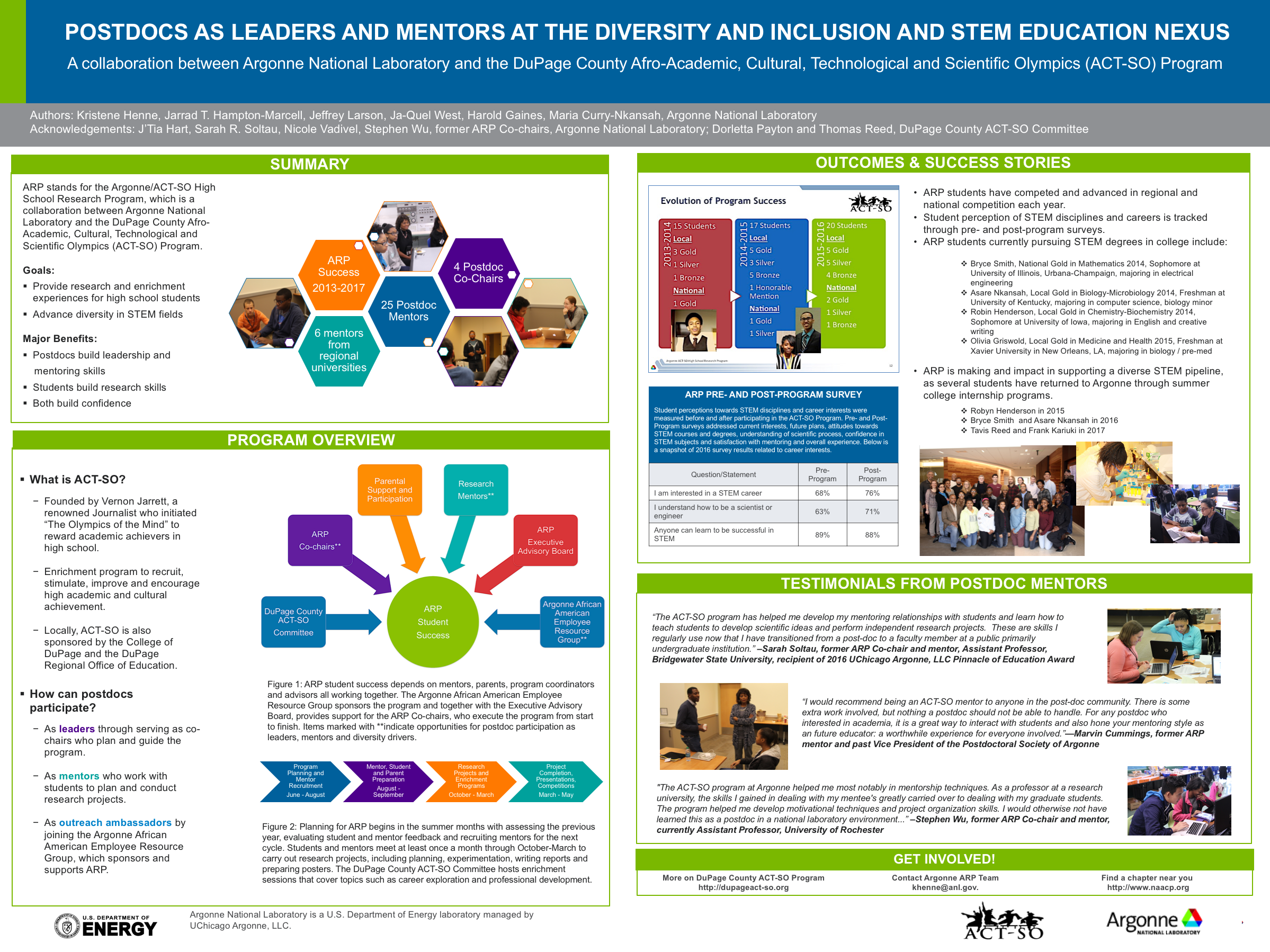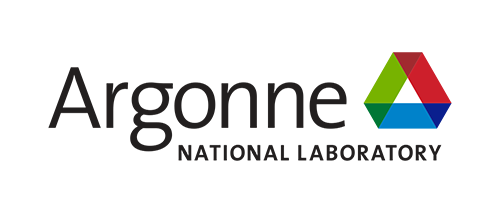Mentors in the ARP play a vital role in guiding and encouraging students as they explore STEM careers and work to complete their independent projects. Choosing to become a mentor gives you the chance to help facilitate deeper exploration of STEM concepts all while giving back your community in a meaningful way.
ARP mutually benefits students and mentors by enriching students’ knowledge and technical skills while providing mentors an opportunity to exercise and fine-tune their leadership and teaching skills. And, as ACT-SO is a national program, the success of its participants shines a light on the capabilities of the mentors who support them, showcasing their ability to cultivate talent and teach.

Role Description
The role of the mentor is to provide guidance to ARP students as they develop independent research projects that are designed to test a hypothesis. The students are the drivers of the project, and mentors are there to provide support and additional ideas. In addition, mentors need to serve as the filter for feasibility, safety and experimental design.
Desired Expertise
Because the ARP focuses on STEM categories within ACT-SO, individuals with professional experience in these ACT-SO categories may apply to become mentors:
- Biology/Microbiology
- Chemistry/Biochemistry
- Computer Science
- Earth/Space Sciences
- Engineering
- Mathematics
- Physics
- Medicine and Health
Expectation
Each mentor is assigned one student, whom they will communicate with regularly over a period of six months. When matching mentors with students, we make every effort to align students and mentor with similar interest.
While some students enter the program with defined projects or interests, other students may enter the program without having had exposure to a wide variety of science classes. These students are interested in science, but may not have a defined project area and are willing to work on a project related to the mentor’s interests or research area.
ARP coordinators host one session a month (six total) over the course of the program. Mentors are expected to attend at least four of the six sessions available, and arrange to meet with their mentee individually if they cannot attend.
The first part of each session is reserved for enrichment activities designed just for ARP students. These activities may include presentations about STEM careers options, reviews of laboratory safety and workshops on how to write scientific papers and prepare posters. The second portion of each session (3 hours) is dedicated to breakout meetings between individual mentors and students.
Along with attending group sessions, mentors will also need to communicate with their students regularly. These meetings may take place in-person at Argonne or another other location decided on with students and their parents, or via phone, Skype, Google Hangout, etc. Mentors and students should communicate at least once a week by phone, email, or video chat.
Outcome
With their mentor’s support, students will develop a testable hypothesis, conduct an experiment and present their results in a 5-page paper that will be due in early March. In addition to the paper, students will prepare a poster that they will use to present their work in the regional ACT-SO competition, hosted by DuPage County in March.
Available Resources
Argonne’s Learning Center provides various resources to support mentors and students in the ARP, including three fully equipped lab rooms, as well as a scanning electron microscope, GC-mass spec and spectrometers. Mentors are welcome to schedule time to use the space and can bring small portable instruments from their own labs to use within it. ARP also provides computation resources to students as needed, including access to LoggerPro software.
Testimonials of Past Mentors
“The ACT-SO program has helped me develop my mentoring relationships with students and learn how to teach students to develop scientific ideas and perform independent research projects. These are skills I regularly use now that I have transitioned from a post-doc to a faculty member at a public primarily undergraduate institution.”
Sarah Soltau, former ARP Co-chair and mentor, currently an assistant professor at Bridgewater State University, recipient of the 2016 UChicago Argonne, LLC Pinnacle of Education Award
“I would recommend being an ACT-SO mentor to anyone in the post-doc community. There is some extra work involved, but nothing a postdoc should not be able to handle. For any postdoc who is interested in academia, it is a great way to interact with students and also hone your mentoring style as a future educator: a worthwhile experience for everyone involved.”
Marvin Cummings, former ARP mentor and past vice president of the Postdoctoral Society of Argonne
“The ACT-SO program at Argonne helped me most notably in improving my mentorship techniques. As a professor at a research university, the skills I gained in dealing with my mentee carried over to dealing with my graduate students. The program helped me develop motivational techniques and project organization skills. I would otherwise not have learned this as a postdoc in a national laboratory environment.”
Stephen Wu, former ARP co-chair and mentor, currently an assistant professor at the University of Rochester
“My involvement in the ACT-SO program, which started in 2014, gave me the opportunity to help raise the numbers of underrepresented groups in STEM fields and academia. Mentoring and working with the students was not only a lot of fun, but also helped me describe my work in simpler terms, which makes presentations of my research easier to understand and accessible to the general public. I also benefited from learning how to tailor my mentoring methods to the students’ needs. These skills are particularly important in leadership positions in academia and R&D departments of companies. I recently entered the next phase of my career, searching for a job in academia, and realized how valuable my experience in the ACT-SO program is for potential future employers.”
Matthias Benjamin Jungfleisch, ARP mentor and Argonne postdoctoral appointee



